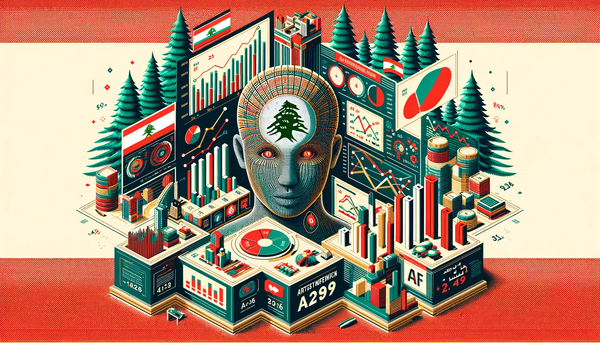AI Chatbots in Lebanon: Why Lebanese Businesses Hesitate

Why aren’t Lebanese businesses adopting AI Chatbots in Lebanon? Explore the obstacles and solutions in Lebanon’s AI landscape. Written by Mohamed Soufan.
In today’s rapidly evolving digital era, AI chatbots are revolutionizing various sectors worldwide, including e-commerce customer service, online sales, healthcare, and tourism. Despite their growing prominence, the adoption of AI chatbots in Lebanon remains limited.
This article examines why AI chatbots face challenges in Lebanese businesses and suggests solutions for better integration across industries.
AI Chatbots in Lebanon: Why Lebanese Businesses Hesitate
Limited Technology Infrastructure for AI chatbots in Lebanon
Lebanon’s limited access to advanced technology, such as reliable internet, can hinder the deployment and upkeep of AI chatbots.
Economic Challenges
Financial crises in Lebanon may discourage businesses from investing in AI tech due to cost-saving priorities over innovation.
Lack of Awareness of AI chatbots in Lebanon
Businesses may not be aware of the benefits of chatbots or may not understand how they can integrate them into their operations.
Language Barriers
Designing AI chatbots for Arabic or local languages is tough due to less advanced NLP tech compared to English.
Privacy and Security Concerns
In Lebanon, data privacy and security concerns arise due to weaker or less enforced data protection regulations in the region.
Cultural Preferences
Lebanese consumers and businesses may have a preference for human interaction and personalized customer service, which could be a barrier to the adoption of chatbots.
Resistance to Change
Businesses might resist adopting new tech like chatbots, fearing job displacement or process disruption.
Limited Access to Talent
Finding skilled AI and machine learning professionals who can develop and maintain chatbot systems may be challenging in Lebanon, leading to a shortage of expertise.
Political and Regulatory Challenges
Political instability and regulatory hurdles in Lebanon can create an uncertain business environment, discouraging investment in AI technologies.
Economic Priorities
Given Lebanon’s urgent economic and social challenges, businesses may prioritize fundamental infrastructure and essential services over AI chatbots.
Bottom line:
AI chatbots face challenges in Lebanon due to limited tech, economic instability, and lack of awareness. Privacy concerns, language barriers, and cultural preferences also matter. Resistance to change and talent shortages hinder adoption. Political and economic factors add to the problem. To improve AI chatbot use, Lebanon needs better tech, awareness, and privacy solutions. Global partnerships may also help.
FAQs for AI Chatbots in Lebanon
What are the reasons why AI chatbots aren't popular in Lebanese businesses?
AI chatbots aren’t very popular in Lebanese businesses. Challenges include economic instability, tech limitations, privacy concerns, and cultural preferences. Resistance to change and talent scarcity slow down their adoption.
How does limited technology infrastructure affect the adoption of AI chatbots in Lebanon?
Lebanon’s AI chatbot adoption is hindered by limited tech infrastructure, with unreliable internet and cloud access making deployment and maintenance challenging for businesses.
What role do economic challenges play in the slow adoption of AI chatbots in Lebanon?
Economic challenges are a major factor in Lebanon’s slow AI chatbot adoption. Ongoing instability can discourage businesses from investing in AI tech, as they prioritize cost-cutting and financial stability over innovation.
Can language barriers hinder the use of AI chatbots in Lebanon?
Language barriers can indeed obstruct AI chatbot usage in Lebanese businesses. Creating effective Arabic and local language chatbots is challenging due to less advanced natural language processing (NLP) tech compared to English.
Why are Lebanese businesses sometimes hesitant to adopt new technologies like chatbots?
Lebanese businesses often hesitate to adopt new technologies like chatbots due to a mix of factors. Economic instability, financial constraints, and uncertainty come first, leading to a cautious approach. Moreover, concerns about job loss, privacy, and a preference for human interaction add to this reluctance.
What are the challenges in finding AI talent for chatbot development in Lebanon?
In Lebanon, recruiting AI talent for chatbot development faces various challenges. A small pool of skilled professionals, tough competition, and brain drain due to economic problems are major obstacles. Plus, providing competitive compensation in an unstable financial environment is difficult.
Conclusion for AI Chatbots in Lebanon
In summary, AI chatbot adoption in Lebanese businesses is hindered by economic instability, tech limitations, cultural factors, and language issues. Privacy concerns, resistance to change, and talent scarcity add to the difficulties. However, by raising awareness, enhancing tech infrastructure, and addressing privacy issues, we can promote AI chatbot integration. Collaboration and support, both local and global, can help overcome these challenges and realize AI chatbots’ benefits for Lebanese businesses.



